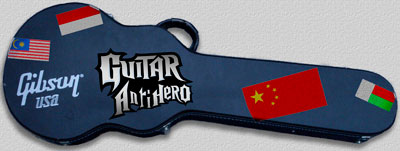 This is the third story in a four-part series about how Gibson Guitar CEO Henry Juszkiewicz and foreign timber companies have turned illegal logging into the Tea Party’s cause célèbre. Read part 1, part 2, and part 4.
This is the third story in a four-part series about how Gibson Guitar CEO Henry Juszkiewicz and foreign timber companies have turned illegal logging into the Tea Party’s cause célèbre. Read part 1, part 2, and part 4.
When the Fish and Wildlife Service carried out a search warrant against Gibson Guitar last month, CEO Henry Juszkiewicz went on the offensive. His company was suspected of illegally importing precious wood from Madagascar and India. In response, he launched a PR campaign aimed at mobilizing right wing groups and media in defense of his company’s alleged illegal activities.
Juszkiewicz started by going to talk radio and using social media, creating the made-for-Tea Party slogan/hash tag #ThisWillNotStand. It was perfectly calibrated to draw the attention of conservative media. Juszkiewicz has appeared on the television talk shows of Glenn Beck, Lou Dobbs, and Sean Hannity, and conservative commentators joined in on the pro-Gibson chorus. The Wall Street Journal even ran a pointed opinion piece taking up the rallying cry.
What was Juszkiewicz’s secret to getting his company’s narrow message so quickly and widely amplified? In part, the groundwork had already been laid for him by a series of Tea Party groups that back an agenda closely aligned with that of large Asian timber companies eager to import wood and paper into the United States from legally and environmentally questionable sources.
At the nexus of these organizations is prominent Tea Party operative Andrew Langer, who played a critical role in organizing many of the original anti-Obama Tea Party rallies. In 2009, Langer started diverting members of his organizations (notably the Institute for Liberty and Frontiers of Freedom) away from the standard array of conservative issues and toward ones narrowly affecting the interests of Chinese, Indonesian, and Malaysian logging companies. He also established a new organization, the Orwellian-sounding “Consumer Alliance for Global Prosperity,” dedicated primarily to attacking a coalition of environmental groups, unions, and businesses that supports rainforest conservation policies. Chief targets included the Lacey Act, which prohibits imports of illegally logged wood and paper, and which Gibson Guitar is now accused of breaking.
These groups even set about attacking American companies (including Disney) that responded to consumer pressure to green their supply chains by eliminating Indonesian wood from their books and other products. The Consumers Alliance for Global Prosperity even produced a parody logo showing Mickey Mouse struggling to free himself from a paper straightjacket emblazoned with the logos of environmental groups and companies that support forest conservation.
Langer told The New York Times that he took up the Asian timber companies’ cause when he heard that tariffs on imported paper could increase the cost of textbooks. The Times suggested otherwise:
Mr. Langer would not say who financed his Indonesian paper initiative. But his sudden interest in the issue coincided with a public relations push by Asia Pulp & Paper. And the institute’s work is remarkably similar to that produced by one of the company’s consultants, a former Australian diplomat named Alan Oxley who works closely with a Washington public affairs firm known for creating corporate campaigns presented as grass-roots efforts.
Asia Pulp & Paper, a huge company that’s part of the Indonesian-Chinese-Malaysian palm oil, timber, and coal conglomerate Sinar Mas, wants to do more business in the U.S. However, environmental groups have long targeted the company and other Asian timber interests for clearing millions of acres of Indonesian rainforest — prime habitat for orangutans, Sumatran tigers, rhinoceroses, and other endangered animals.
To help scrub its public image and tarnish the conservation and trade laws that might stand in its way, Asia Pulp & Paper hired a former U.S. ambassador to Indonesia and launched a major advertising campaign in the Washington Post, New York Times, CNN, and other outlets. Meanwhile, the global anti-forest conservation group World Growth stepped up its Washington-based activities, emitting a flurry of press releases attacking conservation policies and environmental groups.
As all this was happening, Langer’s apparently unwitting Tea Party activists were suddenly being told that loyalty to conservative principles meant attacking the Lacey Act, as well as the United States’ extremely modest level of aid for conservation in foreign countries, and environmental trade policies — all programs that had traditionally had very strong bipartisan support.
When Gibson Guitar’s Juszkiewicz turned to the Tea Party, it was the moment Langer had been waiting for. Langer’s organizations quickly mobilized their social media networks to stump for Gibson. (The group has more than 10,000 Facebook fans on its “Pulp Wars” page, though not all accounts appear to be active.) Langer himself penned an op-ed for the BigGovernment website attacking the government and environmental groups for enforcing the law:
While Tea Partiers are portrayed by the mainstream media as radicals and potentially dangerous, no Tea Partier has ever advocated barging in to someone’s business and confiscating his property. It’s the far left environmental movement that is the real danger here, backed by the deep pockets of George Soros and others, and empowered by an Obama administration that will never solve the country’s jobs crisis if it continues harassing American companies this way. At the very least, it is time to examine this nation’s problem with overcriminalization — starting with the Lacey Act itself.
Primed by Langer’s “grassroots” network and more traditional Beltway lobbying by Asia Pulp & Paper and other companies, Juszkiewicz’s claims had an easy road to acceptance in the right wing media machine. Here, for instance, is Fox News commentator, guitarist, and NRA board member Ted Nugent on the Gibson case:
We have bent over so far as a citizenry in this country that we’ve allowed a communist-raised, communist-educated, communist-trained, a church-goer to the hate-America church — we’ve allowed him to become the president of the United States of America, because we bent over that far. We’ve allowed our federal agents to get away with this kind of jack-booted thuggery.
This type of hardcore rhetoric — and celebrity endorsement — combined with Tea Party rage, conservative media fury, and high-powered public relations seemed to make Gibson the perfect cause for those interested in bashing “big government,” and Republican leaders were quick to jump on it. After inviting Gibson CEO Juszkiewicz to join him in the gallery to watch President Obama’s jobs speech, Speaker of the House John Boehner took up Gibson’s cause a few days later in his own jobs speech:
Those excessive regulations are making it harder for our economy to create jobs. Over the last couple of months we’ve seen two vivid illu
strations. Last month, federal agents raided the Gibson Guitar factories in Tennessee. Gibson is a well-respected American company that employs thousands of people. The company’s costs as a result of the raid? An estimated $2-3 million. Why? Because Gibson bought wood overseas to make guitars in America. Seriously.
With that, the cause shared by large Asian commercial interests and the Tea Party had won the official imprimatur of the highest levels of the GOP establishment.
The truly extraordinary thing about this is that, in their haste to take up a Tea Party rallying cry, Boehner and a handful of other Republicans seem not to have taken a close look at what Gibson was up to, what illegal logging is all about, and which side American businesses — and jobs — are on.
Next: Gibson’s crusade is off-key with U.S. workers.
Full disclosure: Glenn Hurowitz is currently doing communications work for the Environmental Investigation Agency, a nonprofit advocacy organization that is campaigning to protect the Lacey Act from corporate, Tea Party, and Republican attacks. He wrote these articles as a senior fellow at the Center for International Policy, a nonprofit that also works to stop illegal logging.



